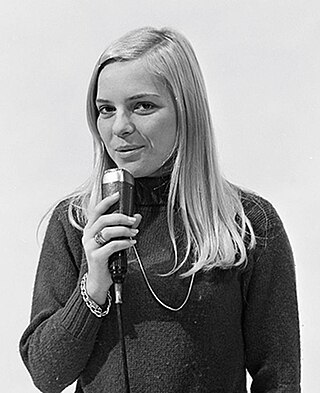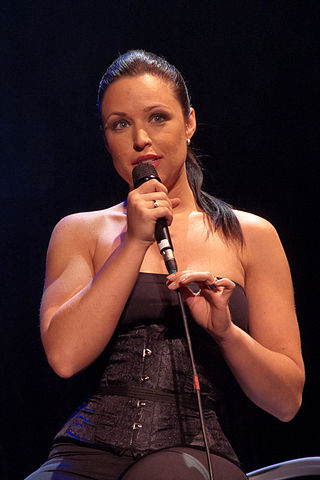
Jean-Philippe Léo Smet, better known by his stage name Johnny Hallyday, was a French rock and roll and pop singer and actor, credited with having brought rock and roll to France.

Isabelle Geneviève Marie Anne Gall, known professionally as France Gall, was a French yé-yé singer. In 1965, at the age of 17, she won the tenth edition of the Eurovision Song Contest with the song "Poupée de cire, poupée de son", representing Luxembourg. Later in her career, she became known for her work with singer-songwriter Michel Berger, whom she married in 1976. Her most successful singles include "Résiste", "Ella, elle l'a" and "Évidemment".

Michel Charles Sardou is a French singer and occasional actor.

Frédérique Hoschedé, better known by the stage name Dorothée, is a French singer and television presenter. She was a continuity announcer on French public broadcaster Antenne 2 from 1977 to 1983, but she is best known for having presented children's television shows like Les mercredis de la jeunesse (1973), Dorothée et ses amis (1977–1978), Récré A2 (1978–1987), and especially Club Dorothée (1987–1997), which totalled up to about thirty hours of broadcast per week and popularized Japanese animation in France.

Natasha St-Pier is a Canadian singer and songwriter of Acadian origin. She has spent most of her career in France, and represented France in the 2001 Eurovision Song Contest with the song "Je n'ai que mon âme".
Victoires de la Musique are an annual French award ceremony where the Victoire accolade is delivered by the French Ministry of Culture to recognize outstanding achievement in the music industry. The classical and jazz versions are the Victoires de la musique classique and Victoires du Jazz.

Michel Jean Hamburger, known professionally as Michel Berger, was a French singer and songwriter. He was a leading figure of France's pop music scene for two decades as a singer; as a songwriter, he was active for such artists as his wife France Gall, Françoise Hardy or Johnny Hallyday. He died of a heart attack at age 44.

Véronique Marie Line Sanson is a three-time Victoires de la Musique award-winning French singer-songwriter and record producer with an avid following in her native country.

Lââm is a French singer of Tunisian descent. She has sold more than 4,000,000 singles & albums.

"La Poupée qui fait non" is a 1966 song written by Franck Gérald (lyrics) and French singer/songwriter Michel Polnareff (music). It was recorded by Polnareff, becoming an immediate success in France and one of Polnareff most definitive songs. Jimmy Page played guitar on the recording. It also appeared as the last track in his album Love Me, Please Love Me.

Rock'n'Roll Attitude is the 34th studio album recorded by French singer Johnny Hallyday. It was released on 26 June 1985.

François Goetghebeur is a French film director, photographer and art director. He became known in the music world thanks to his work including music videos, recordings, documentaries and artists portraits.
Salut les copains is a series of albums released through Universal Music France to commemorate the best of music featured in French scene as sponsored by the "Salut les copains" radio program in France and the French Salut les copains magazine. The tracks include French original singles, French-language covers of known hits as well as European and American hits popular in France. The track list is a representative wide selection of the "Yé-yé" generation of French music.
Raphaël Michel Hamburger is a French producer and a soundtrack music supervisor.

"Je ne suis pas un héros" is a song by French singer Johnny Hallyday, released on his 1980 album À partir de maintenant. It was written by fellow singer Daniel Balavoine who went on to also record and release his own version.
Robin Mark Le Mesurier Halliley was a British guitarist, known for his long collaborations with Rod Stewart and Johnny Hallyday, as well as for the wide-ranging nature of his musical performance, including membership of such bands as The Wombles.

Jean-Baptiste Guégan is a French singer known for his interpretations of Johnny Hallyday songs popularly known as "la voix de Johnny". He was a fan of Hallyday since he was 9 years old when he saw Hallyday perform live in Bercy in 1992. He took part in 2018 in the French Got Talent series La France a un incroyable talent interpreting Hallyday songs and winning the title.

"Mirador" is a 1989 ballad recorded by French singer Johnny Hallyday. Written by Étienne Roda-Gil with a music composed by Hallyday's son David Hallyday, it was the first single from his 36th studio album Cadillac, on which it appears as the second track, and was released in June 1989. It achieved success in France where it was a top three hit.
"Diego libre dans sa tête" is a 1981 song written by Michel Berger for his wife France Gall for her studio album Tout pour la musique, on which it is the eighth track. Two years later, Berger himself recorded his own version of the song. In 1991, it gained popularity when Johnny Hallyday released a live cover which became a top ten hit in France.

Jacques Veneruso is an Algerian-born French musician and songwriter. Between 1976 and 1988, he played in the band Canada, and since then has worked as a songwriter for various French-language artists.















